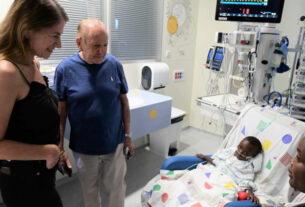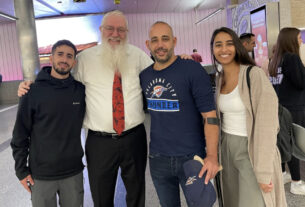As artificial intelligence and robotics reshape industries and daily life, will humans maintain their relevance? Machines excel in efficiency and calculation. But let’s hope there are irreplaceable aspects of the human experience — empathy, creativity and genuine connection — that technology cannot replicate despite the overwhelming profit motive to do so.
AI and robotics are designed to optimize processes, eliminate errors and deliver results with remarkable speed. Yet, the output often lacks the warmth, intuition and emotional intelligence that humans bring to interactions that distinguish man from machine. Further, AI-driven communication tools offer efficiency and convenience, but they can inadvertently flatten the richness of human interaction. Automated responses, generic phrasing, and algorithm-guided conversations may lack empathy, subtlety and personal touch. As reliance on AI grows, there is a risk that our conversations become transactional, losing the vital spark of spontaneity and authenticity that defines human relationships.
The “human touch” isn’t just a metaphor; it’s a vital skill set essential for our survival as a species. Moreover, whether comforting a grieving friend, inspiring a team or providing compassionate care to a patient, these moments require an understanding and empathy that machines simply cannot offer — nor should we want them to. Cultivating skills such as active listening, empathy and conflict resolution ensures that humans remain indispensable in fields where emotional intelligence is paramount. Leaders, coaches, teachers and healthcare providers all rely on these abilities to foster trust, motivate and heal. Even as machines become more sophisticated, the genuine concern and understanding of a person will always stand apart from the programmed responses of a robot.
Technological advancements have made computer-generated voices increasingly lifelike, but they still fall short of the comfort and nuance provided by a loving human voice. A simple phone call from a friend, filled with laughter and concern, can lift spirits in ways no synthesized speech can. The cadence, emotion and spontaneity of human conversation are essential for maintaining meaningful relationships and emotional well-being. AI bots may answer questions, but they cannot provide reassurance, encouragement, or the subtle support that comes from authentic human connection. Language, produced by the human voice, is more than just a tool for exchanging information — it’s a bridge between cultures, a means of expressing identity and a source of comfort. While translation apps and AI-powered interpreters are helpful, they cannot replace the richness of person-to-person communication. Learning new languages fosters cross-cultural understanding, builds trust, and enables deeper relationships that extend far beyond the immediate, and often awkward one-word answers that electronic translation produces. Moreover, bilingual or multilingual individuals can connect with more people, navigate diverse environments and offer personalized support. In global business, travel and diplomacy, the ability to converse directly and authentically remains a critical advantage. Language learning also sharpens cognitive skills and fosters adaptability, further enhancing human relevance in the workplace.
Similarly, machines may deliver precise medical diagnoses or execute flawless procedures, but the comfort of a human hand and the reassurance of personal attention are irreplaceable. In healthcare, social work and hospitality, the ability to offer solace, encouragement and bespoke support is what differentiates human service from automated efficiency. Developing interpersonal skills, emotional intelligence and adaptability ensures that humans remain at the heart of professions where care and comfort are paramount. These roles not only require technical knowledge but also a capacity for compassion and genuine engagement. The function of human language should be understood as a living, breathing reflection of culture, emotion and identity. The nuances in tone, choice of words, idioms and cultural references create a tapestry of meaning that machines often struggle to replicate. When we learn and use language intentionally, we unlock the ability to express ourselves authentically, to understand others deeply and to form bonds that transcend mere data exchange.
The rise of AI and robotics challenges us to rethink our roles but also highlights the enduring importance of human skills. By cultivating abilities that require empathy, creativity, and authentic connection — by learning languages, nurturing relationships and offering comfort — we ensure that humans remain not only relevant but essential in a world shaped by technology. Learning a language is an act of preservation — it keeps alive the intricate web of meaning, emotion and context that only humans can fully appreciate. When individuals invest time in mastering a language, they are not just acquiring vocabulary and grammar; they are gaining the ability to share stories, experiences and feelings in a way that honors both speaker and listener. This ongoing practice helps safeguard the authenticity of person-to-person interaction, even as technology becomes more pervasive. As we embrace innovation, let us also celebrate and strengthen the qualities that make us truly human.
Lisa Ansell is the Associate Director of the USC Casden Institute and Lecturer of Hebrew Language at Hebrew Union College-Jewish Institute of Religion Los Angeles.




